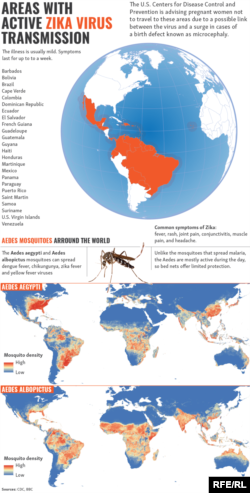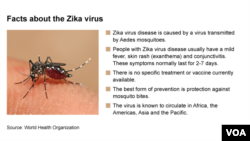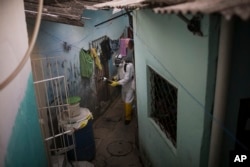The Zika virus outbreak in Latin America could be a bigger threat to global health than the Ebola epidemic that killed more than 11,000 people in Africa.
That's according to several public health experts who spoke with the Guardian and Examiner newspapers ahead of an emergency meeting of the World Health Organization on Monday, which will decide whether the Zika threat should be rated a global health crisis.
Brazilian public health authorities are reporting an increase in cases of microcephaly, a fetal deformation where infants are born with abnormally small heads. The incidence of the normally rare birth defect is 10 times higher than normal.
The cause is under investigation, but there appears to be a correlation between the condition and Zika infections in expectant mothers.
Silent infection
"In many ways the Zika outbreak is worse than the Ebola epidemic of 2014-15," Jeremy Farrar, head of the Wellcome Trust, told the Guardian. "Most virus carriers are symptomless. It is a silent infection in a group of highly vulnerable individuals, pregnant women, that is associated with a horrible outcome for their babies."
There is currently no prospect of a vaccine for Zika, in contrast to Ebola, for which several are now under trial.
"The real problem is that trying to develop a vaccine that would have to be tested on pregnant women is a practical and ethical nightmare," said Mike Turner, head of infection and immunobiology at the Wellcome Trust.
The World Health Organization, U.S. Centers for Disease Control and the Pan American Health Organization warn the Zika virus is spreading rapidly through the Americas and could affect as many as four million people.
Threat to US
Dr. Peter Hotez told the Examiner newspaper that the Zika outbreak in Brazil poses a "far greater threat to the United States than Ebola," A Zika outbreak has "never been seen on this scale," Hotez said, despite its prevalence in Africa, Asia and the Pacific islands.
Zika is a viral illness spread from human to human through the bite of a mosquito.
Two species of mosquito are known to carry the virus, the Yellow Fever mosquito and the Asian Tiger mosquito. Both species are found throughout most of the Americas. The Yellow Fever mosquito can be found along the Gulf Coast of the United States while the Asian Tiger mosquito can be found as far north as New York City.
Avoiding affected countries
Meanwhile, health authorities in several Asian countries have advised travelers, particularly pregnant women, to avoid trips to Central and South America.
The U.S. Centers for Disease Control and Prevention has warned pregnant women against traveling to areas with Zika virus outbreaks.
They have asked people coming or returning from those areas, who display symptoms such as fever and rashes to immediately report to health centers. Doctors are also required to immediately report suspected cases.
Colombia's National Health Institute has recommended couples delay pregnancy for six to eight months.
US, Brazil agree on joint efforts
Faced with the Zika outbreak, the presidents of the United States and Brazil have agreed on "the importance of collaborative efforts" to combat its spread.
Barack Obama and Dilma Rouseff recognize the significance of working together "to deepen our knowledge, advance research, and accelerate work to develop better vaccines and other technologies to control the virus," the White House said.
In the meantime, Brazil has turned to a British company, Oxitec, for help. According to The New York Times, Brazil recently approved the release of multiple groups of genetically modified Aedes Aegypti mosquitoes, created by Oxitec, throughout the country.
The idea behind the release of the mosquitos is for the mature modified males to mate with females. Their offspring who inherited the modified gene would die, causing the mosquito population to dwindle and, hopefully, lower the threat of the disease.
The WHO says the virus has grown rapidly to a public-health threat of "alarming proportions." Julius Lutwana, a virologist at the Uganda Virus Research Institute, told VOA Zika was long thought to pose only a small risk to humans.
Protecting against mosquito bites
The WHO says people with the Zika virus have a mild fever, skin rash and conjunctivitis (red eye) with symptoms lasting between two to seven days. The best prevention against Zika virus, experts say, is protection against mosquito bites.
Outbreaks in Brazil, which reported its first Zika case in 2015, and elsewhere in southern and Central America have led to extensive spraying of insecticides to eradicate mosquitoes.
The WHO's regional office in the Americas said the most effective ways to stop the virus from spreading are to reduce mosquito breeding sites and for people to protect themselves from bites with insect repellent, nets, screens and clothing that covers as much of the body as possible.











